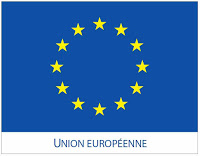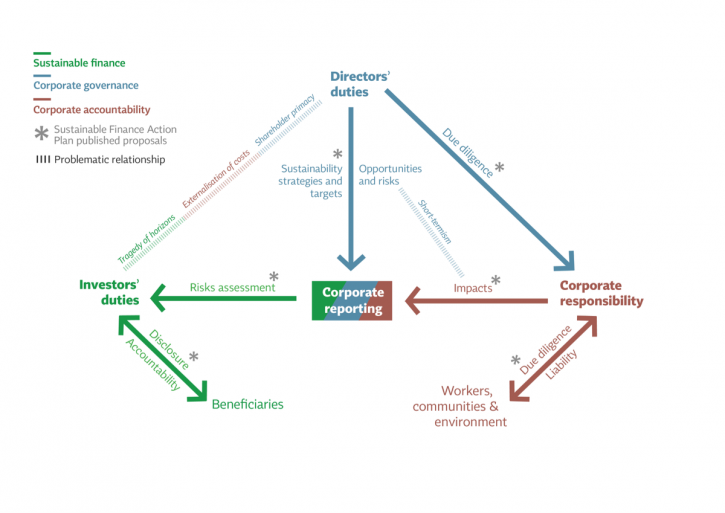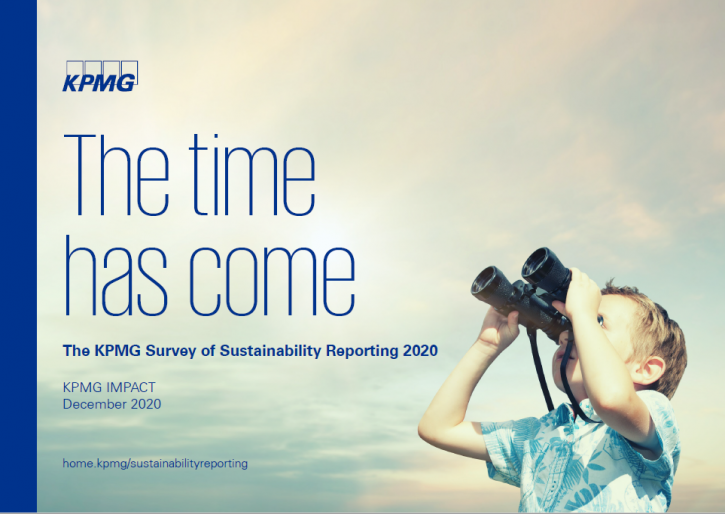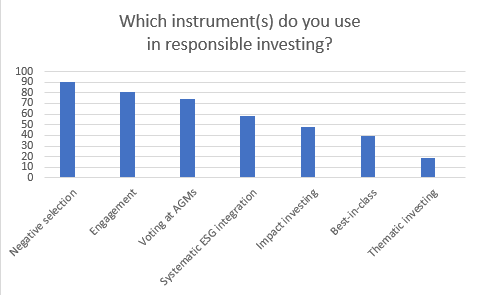actualités internationales Divulgation divulgation extra-financière Gouvernance mission et composition du conseil d'administration Nouvelles diverses Responsabilité sociale des entreprises
Le conseil d’administration et l’information extra-financière : rapport de l’IFA
Ivan Tchotourian 12 mai 2021 Ivan Tchotourian
Excellent travail de l’Institut français des administrateurs (IFA) qui vient de publier un rapport ô combien intéressant : « Le conseil d’administration et l’information extra-financière« .
- Pour se le procurer : ici
Résumé :
Si l’information extra-financière a connu une formidable montée en puissance, elle demeure encore en pleine évolution, avec des contours revisités, et ce, dans un contexte où les attentes en interne à l’entreprise comme de la part des parties prenantes externes vont grandissantes. L’information extra-financière s’invite désormais dans tous les aspects de la vie de l’entreprise, et touche à autant d’enjeux qui sont au cœur des missions du Conseil. Ce document synthétise les tendances qui vont structurer l’information extra-financière dans les prochaines années, et sur cette base, formule des recommandations sur les diligences clés à effectuer par le Conseil. Enfin et surtout, ce rapport affiche l’ambition et les convictions de l’IFA quant au rôle déterminant de l’administrateur en matière d’information extra-financière.
À la prochaine…
actualités internationales Divulgation divulgation extra-financière normes de droit Responsabilité sociale des entreprises
Proposal for a Corporate Sustainability Reporting Directive (CSRD)
Ivan Tchotourian 29 avril 2021 Ivan Tchotourian
Le 21 avril 2021, l’Union européenne a publié une série de mesures touchant la taxonomie, le reporting extra-financier et les devoirs des investisseurs institutionnels.
Éléments essentiels :
The Commission adopted a proposal for a Corporate Sustainability Reporting Directive (CSRD), which would amend the existing reporting requirements of the NFRD. The proposal
- extends the scope to all large companies and all companies listed on regulated markets (except listed micro-enterprises)
- requires the audit (assurance) of reported information
- introduces more detailed reporting requirements, and a requirement to report according to mandatory EU sustainability reporting standards
- requires companies to digitally ‘tag’ the reported information, so it is machine readable and feeds into the European single access point envisaged in the capital markets union action plan
À la prochaine…
actualités internationales Divulgation divulgation extra-financière Gouvernance normes de droit
Les adieux au reporting extra-financier… vraiment ?
Ivan Tchotourian 29 avril 2021 Ivan Tchotourian
Blogging for sustainability offre un beau billet sur la construction européenne du reporting extra-financier : « Goodbye, non-financial reporting! A first look at the EU proposal for corporate sustainability reporting » (David Monciardini et Jukka Mähönen, 26 April 2021). Les auteurs soulignent la dernière position de l’Union européenne (celle du 21 avril 2021 qui modifie le cadre réglementaire du reporting extra-financier) et explique pourquoi celle-ci est pertinente. Du mieux certes, mais encore des critiques !
Extrait :
A breakthrough in the long struggle for corporate accountability?
Compared to the NFRD, the new proposal contains several positive developments.
First, the concept of ‘non-financial reporting’, a misnomer that was widely criticised as obscure, meaningless or even misleading, has been abandoned. Finally we can talk about mandatory sustainability reporting, as it should be.
Second, the Commission is introducing sustainability reporting standards, as a common European framework to ensure comparable information. This is a major breakthrough compared to the NFRD that took a generic and principle-based approach. The proposal requires to develop both generic and sector specific mandatory sustainability reporting standards. However, the devil is in the details. The Commission foresees that the development of the new corporate sustainability standards will be undertaken by the European Financial Reporting Advisory Group (EFRAG), a private organisation dominated by the large accounting firms and industry associations. As we discuss below, the most important issue is to prevent the risks of regulatory capture and privatization of EU norms. What is a step forward, though, is the companies’ duty to report on plans to ensure the compatibility of their business models and strategies with the transition towards a zero-emissions economy in line with the Paris Agreement.
Third, the scope of the proposed CSRD is extended to include ‘all large companies’, not only ‘public interest entities’ (listed companies, banks, and insurance companies). According to the Commission, companies covered by the rules would more than triple from 11,000 to around 49,000. However, only listed small and medium-sized enterprises (SMEs) are included in the proposal. This is a major flaw in the proposal as the negative social and environmental impacts of some SMEs’ activities can be very substantial. Large subsidiaries are thereby excluded from the scope, which also is a major weakness. Besides, instead of scaling the general standards to the complexity and size of all undertakings, the Commission proposes a two-tier regime, running the risk of creating a ‘double standard’ that is less stringent for SMEs.
Fourth, of the most welcomed proposals, however, is strengthening a ‘double materiality’ principle for standards (making it ‘enshrined’, according to the Commission), to cover not only just the risks of unsustainability to companies themselves but also the impacts of companies on society and the environment. Similarly, it is positive that the Commission maintains a multi-stakeholder approach, whereas some of the international initiatives in place privilege the information needs of capital providers over other stakeholders (e.g. IIRC; CDP; and more recently the IFRS).
Fifth, a step forward is the compulsory digitalisation of corporate disclosure whereby information is ‘tagged’ according to a categorisation system that will facilitate a wider access to data.
Finally, the proposal introduces for the first time a general EU-wide audit requirement for reported sustainability information, to ensure it is accurate and reliable. However, the proposal is watered down by the introduction of a ‘limited’ assurance requirement instead of a ‘reasonable’ assurance requirement set to full audit. According to the Commission, full audit would require specific sustainability assurance standards they have not yet planned for. The Commission proposes also that the Member States allow firms other than auditors of financial information to assure sustainability information, without standardised assurance processes. Instead, the Commission could have follow on the successful experience of environmental audit schemes, such as EMAS, that employ specifically trained verifiers.
No time for another corporate reporting façade
As others have pointed out, the proposal is a long-overdue step in the right direction. Yet, the draft also has shortcomings, which will need to be remedied if genuine progress is to be made.
In terms of standard-setting governance, the draft directive specifies that standards should be developed through a multi-stakeholder process. However, we believe that such a process requires more than symbolic trade union and civil society involvement. EFRAG shall have its own dedicated budget and staff so to ensure adequate capacity to conduct independent research. Similarly, given the differences between sustainability and financial reporting standards, EFRAG shall permanently incorporate a balanced representation of trade unions, investors, civil society and companies and their organisations, in line with a multi-stakeholder approach.
The proposal is ambiguous in relation to the role of private market-driven initiatives and interest groups. It is crucial that the standards are aligned to the sustainability principles that are written in the EU Treaties and informed by a comprehensive science-based understanding of sustainability. The announcement in January 2020 of the development of EU sustainability reporting standards has been followed by the sudden move by international accounting body the IFRS Foundation to create a global standard setting structure, focusing only on financially material climate-related disclosures. In the months to come, we can expect enormous pressure on EU policy-makers to adopt this privatised and narrower approach, widely criticised by the academic community.
Furthermore, the proposal still represents silo thinking, separating sustainability disclosure from the need to review and reform financial accounting rules (that remain untouched). It still emphasises transparency over governance. Albeit it includes a requirement for companies to report on sustainability due diligence and actual and potential adverse impacts connected with the company’s value chain, it lacks policy coherence. The proposal’s link with DG Justice upcoming legislation on the boards’ sustainability due diligence duties later this year is still tenuous.
After decades of struggles for mandatory high-quality corporate sustainability disclosure, we cannot afford another corporate reporting façade. It is time for real progress towards corporate accountability.
À la prochaine…
Divulgation divulgation extra-financière Gouvernance Normes d'encadrement normes de droit normes de marché Responsabilité sociale des entreprises
La SEC consulte sur le changement climatique
Ivan Tchotourian 14 avril 2021 Ivan Tchotourian
La SEC a publié récemment une nouvelle sur son site indiquant qu’elle chercher l’avis du public sur sa réglementation dans le domaine du changement climatique : « Public Input Welcomed on Climate Change Disclosures » (15 mars 2021). C’est le moment de vous exprimer !
La SEC bouge en ce domaine comme cet extrait du message de la SEC le résume bien : Since 2010, investor demand for, and company disclosure of information about, climate change risks, impacts, and opportunities has grown dramatically. Consequently, questions arise about whether climate change disclosures adequately inform investors about known material risks, uncertainties, impacts, and opportunities, and whether greater consistency could be achieved. In May 2020, the SEC Investor Advisory Committee approved recommendations urging the Commission to begin an effort to update reporting requirements for issuers to include material, decision-useful environmental, social, and governance, or ESG factors. In December 2020, the ESG Subcommittee of the SEC Asset Management Advisory Committee issued a preliminary recommendation that the Commission require the adoption of standards by which corporate issuers disclose material ESG risks.
Extrait :
Questions for Consideration
- How can the Commission best regulate, monitor, review, and guide climate change disclosures in order to provide more consistent, comparable, and reliable information for investors while also providing greater clarity to registrants as to what is expected of them? Where and how should such disclosures be provided? Should any such disclosures be included in annual reports, other periodic filings, or otherwise be furnished?
- What information related to climate risks can be quantified and measured? How are markets currently using quantified information? Are there specific metrics on which all registrants should report (such as, for example, scopes 1, 2, and 3 greenhouse gas emissions, and greenhouse gas reduction goals)? What quantified and measured information or metrics should be disclosed because it may be material to an investment or voting decision? Should disclosures be tiered or scaled based on the size and/or type of registrant)? If so, how? Should disclosures be phased in over time? If so, how? How are markets evaluating and pricing externalities of contributions to climate change? Do climate change related impacts affect the cost of capital, and if so, how and in what ways? How have registrants or investors analyzed risks and costs associated with climate change? What are registrants doing internally to evaluate or project climate scenarios, and what information from or about such internal evaluations should be disclosed to investors to inform investment and voting decisions? How does the absence or presence of robust carbon markets impact firms’ analysis of the risks and costs associated with climate change?
- What are the advantages and disadvantages of permitting investors, registrants, and other industry participants to develop disclosure standards mutually agreed by them? Should those standards satisfy minimum disclosure requirements established by the Commission? How should such a system work? What minimum disclosure requirements should the Commission establish if it were to allow industry-led disclosure standards? What level of granularity should be used to define industries (e.g., two-digit SIC, four-digit SIC, etc.)?
- What are the advantages and disadvantages of establishing different climate change reporting standards for different industries, such as the financial sector, oil and gas, transportation, etc.? How should any such industry-focused standards be developed and implemented?
- What are the advantages and disadvantages of rules that incorporate or draw on existing frameworks, such as, for example, those developed by the Task Force on Climate-Related Financial Disclosures (TCFD), the Sustainability Accounting Standards Board (SASB), and the Climate Disclosure Standards Board (CDSB)?[7] Are there any specific frameworks that the Commission should consider? If so, which frameworks and why?
- How should any disclosure requirements be updated, improved, augmented, or otherwise changed over time? Should the Commission itself carry out these tasks, or should it adopt or identify criteria for identifying other organization(s) to do so? If the latter, what organization(s) should be responsible for doing so, and what role should the Commission play in governance or funding? Should the Commission designate a climate or ESG disclosure standard setter? If so, what should the characteristics of such a standard setter be? Is there an existing climate disclosure standard setter that the Commission should consider?
- What is the best approach for requiring climate-related disclosures? For example, should any such disclosures be incorporated into existing rules such as Regulation S-K or Regulation S-X, or should a new regulation devoted entirely to climate risks, opportunities, and impacts be promulgated? Should any such disclosures be filed with or furnished to the Commission?
- How, if at all, should registrants disclose their internal governance and oversight of climate-related issues? For example, what are the advantages and disadvantages of requiring disclosure concerning the connection between executive or employee compensation and climate change risks and impacts?
- What are the advantages and disadvantages of developing a single set of global standards applicable to companies around the world, including registrants under the Commission’s rules, versus multiple standard setters and standards? If there were to be a single standard setter and set of standards, which one should it be? What are the advantages and disadvantages of establishing a minimum global set of standards as a baseline that individual jurisdictions could build on versus a comprehensive set of standards? If there are multiple standard setters, how can standards be aligned to enhance comparability and reliability? What should be the interaction between any global standard and Commission requirements? If the Commission were to endorse or incorporate a global standard, what are the advantages and disadvantages of having mandatory compliance?
- How should disclosures under any such standards be enforced or assessed? For example, what are the advantages and disadvantages of making disclosures subject to audit or another form of assurance? If there is an audit or assurance process or requirement, what organization(s) should perform such tasks? What relationship should the Commission or other existing bodies have to such tasks? What assurance framework should the Commission consider requiring or permitting?
- Should the Commission consider other measures to ensure the reliability of climate-related disclosures? Should the Commission, for example, consider whether management’s annual report on internal control over financial reporting and related requirements should be updated to ensure sufficient analysis of controls around climate reporting? Should the Commission consider requiring a certification by the CEO, CFO, or other corporate officer relating to climate disclosures?
- What are the advantages and disadvantages of a “comply or explain” framework for climate change that would permit registrants to either comply with, or if they do not comply, explain why they have not complied with the disclosure rules? How should this work? Should “comply or explain” apply to all climate change disclosures or just select ones, and why?
- How should the Commission craft rules that elicit meaningful discussion of the registrant’s views on its climate-related risks and opportunities? What are the advantages and disadvantages of requiring disclosed metrics to be accompanied with a sustainability disclosure and analysis section similar to the current Management’s Discussion and Analysis of Financial Condition and Results of Operations?
- What climate-related information is available with respect to private companies, and how should the Commission’s rules address private companies’ climate disclosures, such as through exempt offerings, or its oversight of certain investment advisers and funds?
- In addition to climate-related disclosure, the staff is evaluating a range of disclosure issues under the heading of environmental, social, and governance, or ESG, matters. Should climate-related requirements be one component of a broader ESG disclosure framework? How should the Commission craft climate-related disclosure requirements that would complement a broader ESG disclosure standard? How do climate-related disclosure issues relate to the broader spectrum of ESG disclosure issues?
À la prochaine…
Base documentaire Divulgation Gouvernance Normes d'encadrement Nouvelles diverses objectifs de l'entreprise Responsabilité sociale des entreprises
Les entreprises peuvent-elles travailler au bien commun ? Un débat sur France Culture !
lgdemerxem 6 décembre 2020 Loïc Geelhand de Merxem
Il y aurait donc un mouvement général vers un meilleur encadrement des entreprises, leur responsabilisation sur des enjeux comme l’environnement, la diversité, le partage de la valeur ou le partage du pouvoir. Et les entreprises dites de la Tech en seraient le fer de lance. L’économie de demain sera écologique et sociale ou ne sera pas disent les uns… tout ceci n’est green ou social washing rétorquent les autres. Mais surtout, la question qui reste entière c’est de savoir qui dit le « good », de quel « bien » parle-t-on, qui et comment le mesure-t-on ?
Un débat à découvrir sur France Culture ou juste ci-dessous :
actualités internationales Base documentaire Divulgation divulgation extra-financière Nouvelles diverses rapport Responsabilité sociale des entreprises
« The KPMG Survey of Sustainability Reporting 2020 » vient d’être publié !
lgdemerxem 3 décembre 2020 Loïc Geelhand de Merxem
KPMG a publié cette semaine la 11e édition de son enquête KPMG sur l’état du reporting extrafinancier. Cette enquête annuelle permet de suivre les changements considérables survenus dans les rapports extrafinanciers depuis la première publication de l’enquête en 1993. Cette année, les professionnels de KPMG ont examiné les rapports de développement durable de 5 200 entreprises dans 52 pays et juridictions, ce qui en fait un document de référence !
L’enquête fournit un aperçu détaillé des tendances mondiales en matière de reporting extrafinancier et offre des perspectives aux dirigeants d’entreprises, aux conseils d’administration et aux professionnels du développement durable. Son objectif est d’aider ceux qui ont la responsabilité d’évaluer et de préparer ces rapports dans leur propre organisation.
L’enquête sert également de guide aux investisseurs, aux gestionnaires d’actifs et aux agences de notation qui tiennent désormais compte des informations sur le développement durable ou sur l’environnement, la société et la gouvernance (ESG) dans leur évaluation des performances et des risques des entreprises.
L’enquête 2020 se concentre sur quatre aspects clés des rapports de développement durable. Vous trouverez dans le lien ci-dessous un résumé des principales conclusions de l’enquête ainsi que le document au complet :
https://home.kpmg/xx/en/home/insights/2020/11/the-time-has-come-survey-of-sustainability-reporting.html
Divulgation finance sociale et investissement responsable Gouvernance Responsabilité sociale des entreprises
Fonds de pension hollandais : fronde contre le greenwashing
Ivan Tchotourian 23 novembre 2020 Ivan Tchotourian
IPE Magazine de novembre 2020 publie un article de Tjibbe Hoekstra initulé : « Survey: Dutch pension funds accuse asset managers of greenwashing » (16 septembre 2020).
Extrait :
Some asset managers do not invest as responsibly as they claim, a number of Dutch pension funds have said.
In a survey among 31 Dutch pension funds carried out by Dutch pensions publication Pensioen Pro, six in 10 Dutch pension funds agreed with the statement that some asset managers engage in greenwashing.
None of the participating pension funds, with combined assets under management worth €1.2trn, disagreed with the statement that greenwashing is a problem.
An important reason asset managers are being given the chance to engage in greenwashing is a lack of commonly agreed environmental, social, and corporate governance (ESG) standards, many pension funds believed.
Some 56% of respondents even saw the absence of a common ESG definition as a threat to responsible investing, the survey found.
Responsible investing is a rising trend in the Dutch pension sector, with 87% of the surveyed funds now having their own sustainable investment policy. The remaining 13% have outsourced this to their fiduciary manager.
None of the surveyed funds said they have no dedicated policy for responsible investing.
À la prochaine…




